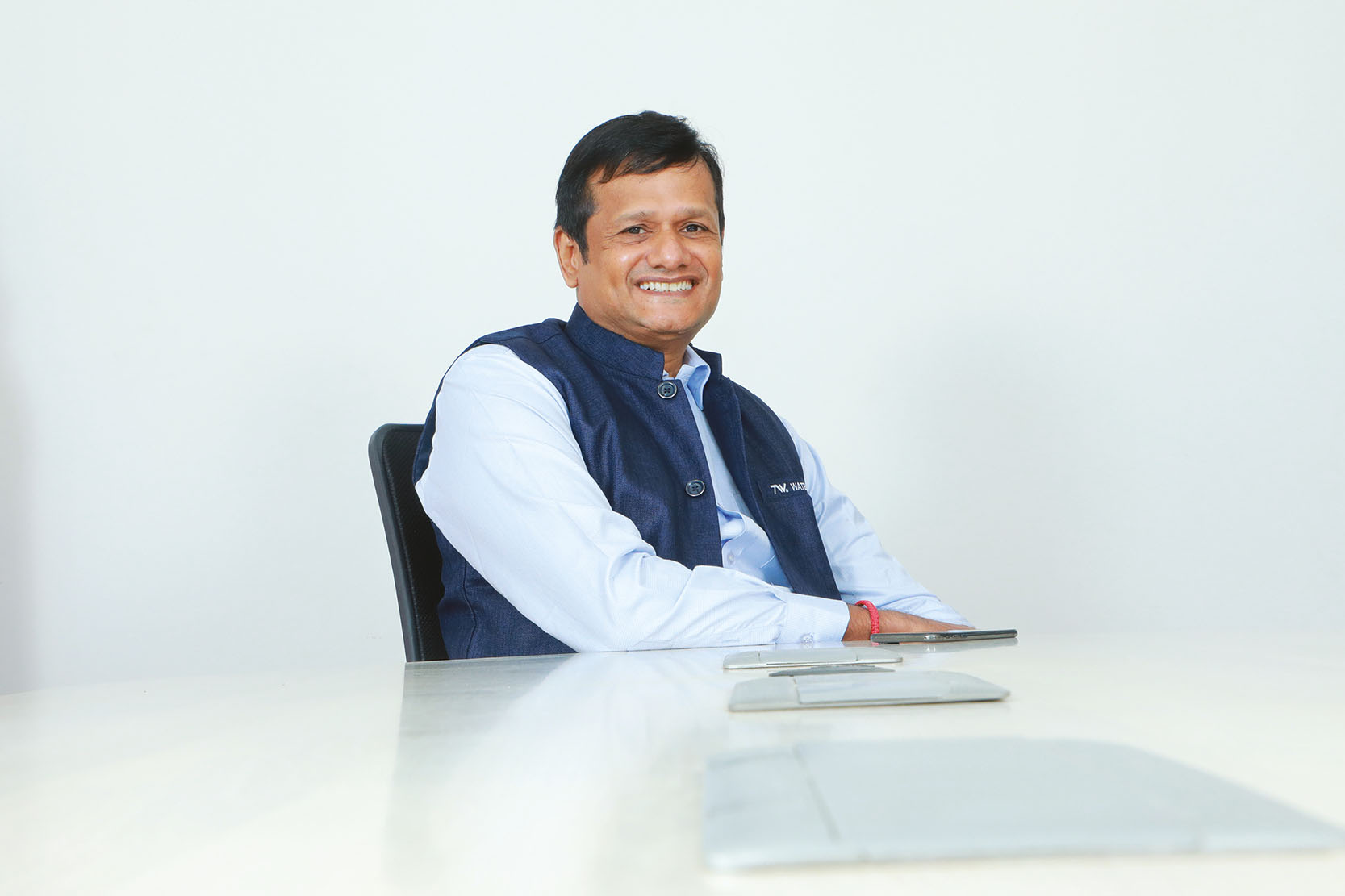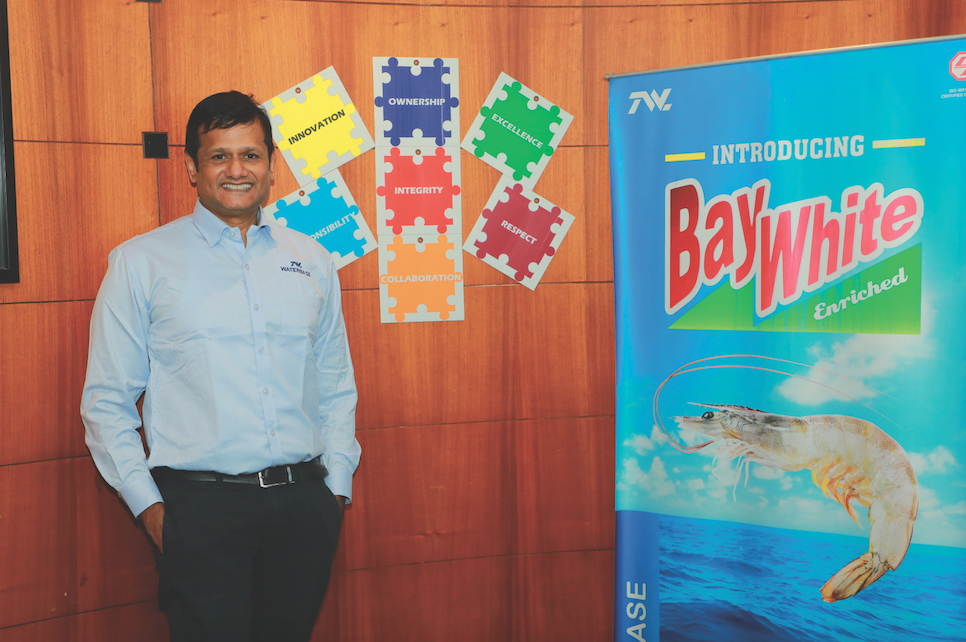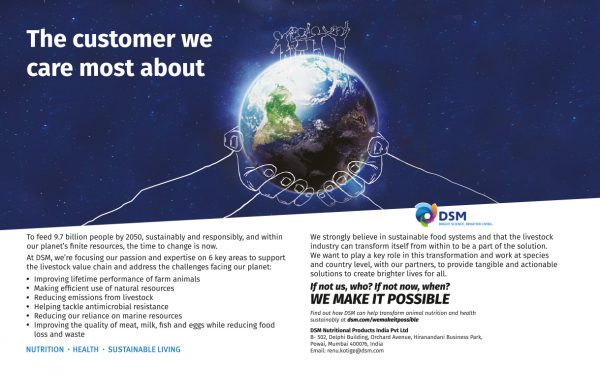Shrimp farming may not be the first thing one associates with India, but today, the country is the world’s largest exporter of the little crustacean. The industry only began in the 1980s, but its rapid ascension, especially in the past decade, has created a booming market in India.

Shaping and driving the industry’s growth since its foundation in 1993 is The Waterbase Limited, a shrimp aquaculture firm that collaborates with global research bodies, aquaculture institutes and industry experts to bring innovation and excellence to the industry.
Ramakanth Akula, CEO, says the company’s history with shrimp farming is well known. “The whole country acknowledges the fact that Waterbase has played a stellar role in making India the number-one shrimp exporter,” he shares.
“Imparting education to the industry – whether it be for shrimp farmers or hatchery operators, processing people or feed technical staff – Waterbase has been an institution all along. People have that trust in us and we have a legacy.” Ramakanth believes the company possesses clear and deeply embedded corporate values.
This commitment to ethics is best evinced by its rise to success in the 90s. The industry wasn’t exactly thriving at the time, but Waterbase didn’t cut and run, instead aiming to grow the sector. It’s a broader focus on inclusive growth rather than a narrow focus on making money, he adds, and the aquaculture industry recognises this.
With India still in a growth phase, innovation is crucial to all developing industries across the subcontinent, and Ramakanth understands this. He views Waterbase’s focus on innovation as another differentiator in this environment.
Equally, he says his own team helps the company stand out by bringing competence, talent and professionalism; some employees have been there from the start while others have just begun their careers, all bringing their own strengths.
“This segment is becoming a bit overcrowded right now, but we clearly have our own place in the industry,” he says.

“It is because of how we do business, the way we carry ourselves with transparency, with more focus on the farmer, and focusing more on the growth of our channel partners than on the business. This sets us apart from others, and the continued focus on innovation gives us that edge over the competition.”
These days, considerable work is put into supporting the shrimp farming industry. New innovations are delivered on a regular basis to improve yield and sustain the growth momentum. As part of its efforts to support the industry, Ramakanth says, Waterbase advises farmers to pursue caution as the industry develops, rather than be guided by greed.
With so much growth on the horizon, India’s shrimp industry appears both promising and challenging. “There is increased competition because everybody is taking the long view,” Ramakanth explains.
“They foresee that the growth momentum will continue and capacities will be absorbed as we move on. With that foresight, a lot of companies and players have come in. That way, it has become a bit more competitive as well. On the raw materials front, there were some challenges in the past two or three years. Overall, however, I would say there’s healthy growth for India and Indian shrimp exports.”
Waterbase has played a stellar role in making India the number-one shrimp exporter.
Waterbase itself is no exception to this industry-wide boom. As the company has expanded its capacities, it has ventured into new domestic markets, such as Odisha and West Bengal. It’s a slow and steady development, and Ramakanth expects these developments to bear fruit within the next year or two.
Of course, COVID-19 has slowed exports and has had a catastrophic effect on the shrimp industry. Hatcheries, farms, processors, retailers and exporters have all been affected – the lockdown drove farmers to hastily harvest their supply, but issues in delivery meant that prices crashed.
More than 90% of India’s shrimp aquaculture business is dependent on export, and given that most shrimp is consumed in restaurants, hotels and so on, demand fell in the first half of 2020.
Ramakanth is now optimistic that the industry is recovering from what represented a huge crisis, and Waterbase’s recovery has no doubt been aided by the business continuity plan that continued to evolve in response to the pandemic’s spread.
At the same time, caring for the health and safety of employees was critical. “During any crisis, one should always give top priority to your employees,” Ramakanth insists. “This is critical for your operational continuity.
Be compassionate and show empathy to people because everybody is going through stressful times. First and foremost, you should take care of your employees. If they are with you, then you can offer your best services to your customers.”
Working from home was implemented, with employees given the tools to ensure they could continue their work. Production loads could be shifted from site to site to respond to outbreaks in new areas, and Waterbase retained financial liquidity in order to stay flexible and responsive to changes.
Looking past the pandemic, Ramakanth foresees a demand for new farming efficiencies and better services for farmers, but for now, he offers some advice for business leaders as they ride out the remainder of the pandemic.
“Every company should focus on these key things: compassion and empathy,” he says. “Be agile, be flexible and keep your cash flow going. Remain liquid, because opportunities will come your way. Be adaptable.
“You should lead by example. For any leader, especially in a crisis like this, you should be at the front line, demonstrating your leadership. People should be able to look up to you and feel comfort that, yes, my boss is on the front line. He’s leading the war in this crisis. Once you get buy-in from your team, I think your job is well done and you are ready to take advantage of the situation when it returns to normalcy.”
Proudly supported by:



